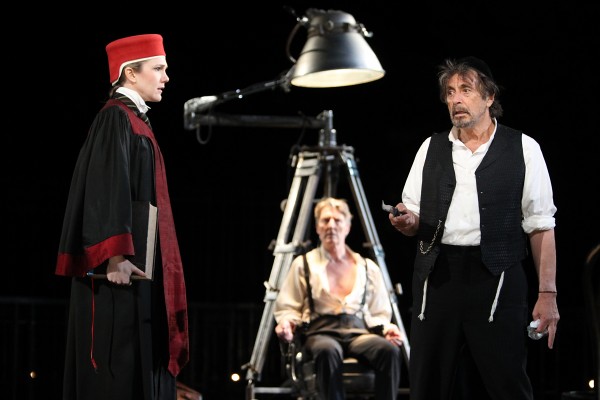There were lots of things happening at the Delacourte Theater last Monday night at the Gala performance of Shakespeare’s The Merchant of Venice. Sure, this is partly because the Gala drew scads of big-name-stars like James Gandolfini, Kate Walsh and Glee’s Jonathan Groff. But it’s also mostly because there are about six thousand characters and just shy of seven bazillion plotlines going on in this Comi-Tragi-Everything play.
The Merchant of Venice is a complex tale—of lovers and family, debtors and creditors, horrifying prejudice and absent mercy—whose contrasting comedic and tragic plotlines can be difficult to make sense of, but Daniel Sullivan’s deft, insightful direction cut down on the noise and focused the production. Though his staging of Merchant highlighted the play’s dark underbelly more prominently than previous productions, the tone felt entirely appropriate and even beautiful in its melancholy.
In turn, the quiet focus provided by Sullivan’s direction afforded the actors—all six thousand of them—the chance to become the evening’s brightest stars. And damn, did they shine. Hamish Linklater—an hilarious highlight of Summer 2009 as Sir Andrew Aguecheek in The Twelfth Night—stretched his more dramatic muscles as Bassanio, while still maintaining a beautiful measure of comic lightness. Jesse L. Martin gave a perfectly calibrated, perfectly hammy performance as Gratiano. And Bill Heck and Heather Lind—a stapping Lorenzo and sensitive Jessica—brought a new level of depth and sadness to their characters’ relationship, while Marianne Jean-Baptiste played a bright Nerissa and Byron Jennings an affecting Antonio.
Still the evening’s biggest stars, its biggest stories, were Al Pacino and Lily Rabe. And yes, I just called Lily Rabe one of the evening’s biggest stars.
Perhaps Pacino was the real story, here. Or should have been. He was certainly the star with the most mega-watt credentials when he set foot on the stage. But I left the theater talking about Ms. Rabe.
Pacino’s Shylock was, well, classic Pacino—with that magical, maddening, measured delivery—so strong you completely lost the line between character and actor (at intermission, I actually caught myself worrying about Pacino’s health because Shylock had a pronounced limp). But at times Pacino being Pacino was a bit heavy-handed. Sometimes his thoughtful Pacino pauses went on so long I wondered if he’d dropped a line.
But Ms. Rabe—as the heroine Portia—was illuminating. Rabe carried the show with grace, never once appearing to strain under the weight of such an historic role. Her Portia was both enlightened and enlightening. She was beautiful, charming, and knock-your-socks-off intelligent. She was perfect. And hey, watching her make out with Hamish Linklater wasn’t so bad, either. (I mean, if I can’t do it, somebody should!)
At the end of the night, it was Ms. Rabe who seemed the brightest star. The one whose next role I’ll seek out feverishly.
Of course, Pacino will still be Pacino. Will always be Pacino. The lines outside Central Park—the ones growing longer and longer and beginning earlier and earlier—will be there for him. But those lucky enough to get tickets will be in for a real treat. They’ll get to see one of acting’s established best go toe-to-toe with an actress they’ve probably never heard of before. And she’ll win. Though I guess, at the end of the day, it’s the audience who really wins.



{ 0 comments… add one }